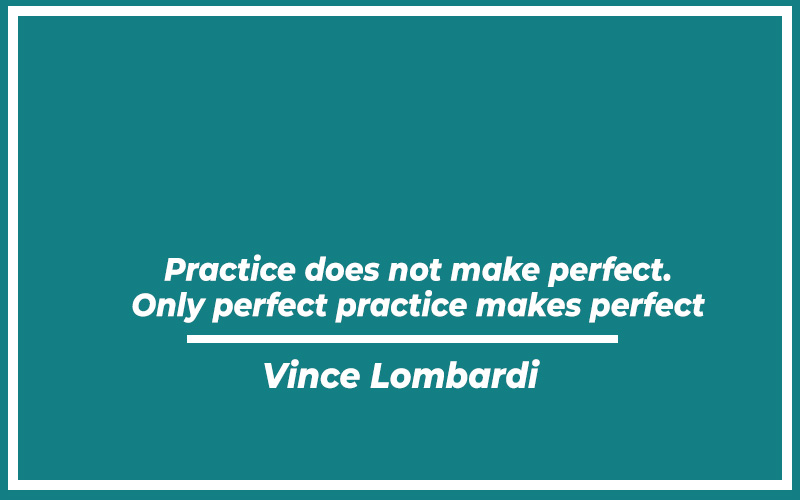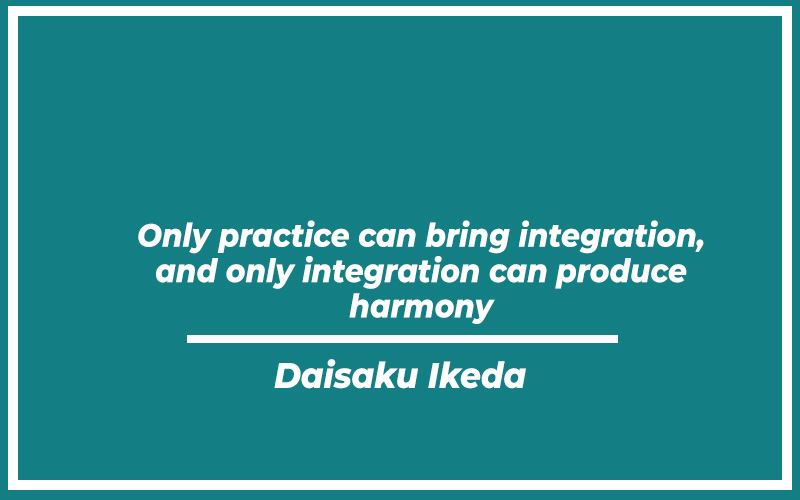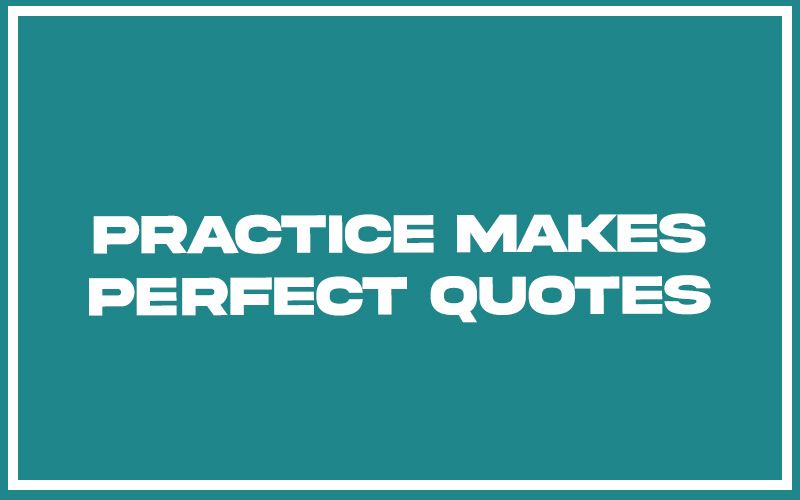You know how they say, “practice makes perfect”? There’s a lot of truth to that, isn’t there?
Quotes about practicing towards perfection remind us that achievement isn’t just about talent—it’s also about dedication and hard work.
Whether you’re a musician working on a difficult piece, an athlete trying to improve your game, or a student mastering a complex subject, these quotes can inspire you to keep pushing forward. They emphasize the importance of consistent effort and resilience, showing that perseverance is just as important as innate skill.
Best Practice Makes Perfect Quotes

“Practice does not make perfect. Only perfect practice makes perfect.” – Vince Lombardi
Vince Lombardi stresses that not all practice leads to perfection; only practice conducted in the right way does. This perspective challenges the notion that mere repetition is sufficient. Instead, Lombardi argues for a structured and focused approach to practice, where attention to detail and corrections of mistakes are crucial.
This approach ensures that one is not merely reinforcing bad habits but is progressively moving towards mastery. Lombardi’s insight is valuable for anyone looking to improve in sports, arts, or any other skill.
Also Read: Rodeo Quotes (with Explanation)
“To become really good at anything, you have to practice and repeat, practice and repeat, until the technique becomes intuitive.” – Paulo Coelho
Paulo Coelho articulates the transformative power of practice in achieving mastery. The quote implies that to excel in any field, consistent and deliberate practice is required until the actions become second nature.
This process of repetition helps to internalize the skills deeply, making them automatic and intuitive. Coelho’s words encourage perseverance and dedication, emphasizing that proficiency in any skill is a gradual process that evolves through continuous practice.
“Practice makes perfect. Use your spare time.” – Unknown
This advice highlights the practical use of one’s time to hone skills and achieve perfection. It suggests that every available moment is an opportunity for improvement and that diligent use of one’s spare time can significantly contribute to one’s journey towards mastery.
The notion that practice should fill one’s free moments encourages a disciplined and dedicated approach to personal and professional development, underscoring the importance of time management in the pursuit of excellence.
“Practice is the hardest part of learning, and training is the essence of transformation.” – Ann Voskamp
Ann Voskamp emphasizes that practice, while the most challenging aspect of learning, is crucial for transformation. This quote recognizes the difficulties inherent in consistent practice and training but also frames these activities as transformative processes that yield significant personal growth.
Voskamp’s words inspire those learning new skills to embrace the rigor of practice as a pathway to becoming better, highlighting that real change comes from enduring through challenges.
“I practice my saxophone three hours a day. I’m not saying I’m particularly special, but if you do something three hours a day for forty years, you get pretty good at it.” – Kenny G
Kenny G’s comment on his practice routine reveals how long-term, dedicated practice can lead to high proficiency. This quote provides a practical example of the commitment required to excel in a musical instrument, suggesting that sustained effort over an extended period is key to mastery.
It demystifies talent, proposing that consistent work, rather than innate specialness, is the real driver of exceptional skill.
“Learning the art of painting is not an easy task. It takes a great deal of intelligence, keen analysis, study and practice.” – Edgar Alwin Payne
Edgar Alwin Payne outlines the comprehensive nature of mastering painting, emphasizing that practice is only one part of a broader learning process involving intelligence and analytical skills.
This quote widens the understanding of what it takes to become proficient in painting, highlighting the necessity of a multifaceted approach that combines theoretical knowledge with practical application. Payne’s perspective is valuable for learners in any discipline, stressing the importance of a well-rounded approach to mastering any art form.
“No one can teach riding so well as a horse.” – C. S. Lewis
C. S. Lewis uses a metaphor to illustrate the importance of experiential learning, particularly in skill acquisition like horse riding. This quote suggests that direct interaction and practice with the subject at hand provide the best learning opportunities, surpassing theoretical knowledge.
Lewis’s observation encourages learners to engage actively with their field of study, promoting hands-on experience as the most effective teacher in developing practical skills.
“The more you practice, the better you get, the more freedom you have to create.” – Jocko Willink
Jocko Willink’s quote emphasizes the liberating power of practice. By dedicating time to refine skills, individuals increase their proficiency, which in turn expands their creative capabilities. Willink suggests that mastery achieved through practice provides the foundation necessary for innovation and creativity.
This perspective not only highlights the importance of consistent effort in skill development but also ties practice to the larger goal of creative freedom, inspiring a disciplined yet imaginative approach to personal and professional pursuits.
“An amateur practices until they can get it right; a professional practices until they can’t get it wrong.” – Julie Andrews
Julie Andrews distinguishes between the practice habits of amateurs and professionals. This insightful quote suggests that the key to true expertise is not just the ability to perform well occasionally but the consistency to do so under any circumstance.
Andrews’ statement encourages a depth of practice that goes beyond competence to reach the realm of second nature, advocating for a rigorous and relentless practice regimen.
“Practice what you know, and it will help to make clear what now you do not know.” – Rembrandt
Rembrandt’s quote underscores the role of practice as a tool for learning and discovery. By continuously engaging with familiar skills, individuals not only reinforce their knowledge but also illuminate areas that need improvement.
This method of practice serves as both a reinforcement of existing abilities and a beacon for future learning, encouraging a proactive approach to personal development and mastery.
“If you don’t practice you don’t deserve to win.” – Andre Agassi
Andre Agassi’s statement reflects a straightforward ethos: the right to success comes from hard work and dedication. By linking practice directly to deserving victory, Agassi emphasizes that achievement is not a matter of chance but a reward for persistent effort.
This quote motivates individuals to approach their goals with a strong work ethic, highlighting the importance of preparation in achieving success.
“It’s not necessarily the amount of time you spend at practice that counts; it’s what you put into the practice.” – Eric Lindros
Eric Lindros challenges the notion that mere time spent in practice equates to improvement. Instead, he stresses the quality of effort invested during practice sessions.
Lindros’ insight shifts the focus from the quantity of practice to the intensity and intentionality of each session, encouraging individuals to engage deeply and meaningfully with their practice to maximize their growth and efficiency.
“Practice is the best of all instructors.” – Publilius Syrus
Publilius Syrus highlights the intrinsic value of practice as a teacher. This ancient wisdom suggests that experiential learning through repeated practice offers lessons that theoretical knowledge cannot match.
Syrus’ quote extols the virtues of learning by doing, advocating for a hands-on approach to skill acquisition and mastery that has stood the test of time.
“Only one thing registers on the subconscious mind: repetitive application—practice. What you practice is what you manifest.” – Fay Weldon
Fay Weldon delves into the psychological impacts of practice, suggesting that repetition not only enhances skill but also imprints these abilities on the subconscious mind.
Her quote connects the dots between habitual practice and its manifestation in real-life performance, proposing that consistent practice not only perfects a skill but also embeds it deeply within one’s behavior and personality, influencing outcomes across various aspects of life.
“Excellence is not a singular act but a habit. You are what you repeatedly do.” – Aristotle
Aristotle’s timeless observation underscores that excellence emerges not from isolated instances but from habitual action. This quote suggests that consistent practice forms the bedrock of excellence, shaping one’s character and capabilities through repeated actions. It promotes the idea that developing excellence in any field is less about sporadic efforts and more about cultivating a routine that reinforces high standards and quality in everyday actions.
“The more you practice, the better you get, the more freedom you have to create.” – Jocko Willink
Jocko Willink emphasizes that proficiency gained through practice offers greater creative freedom. This quote suggests that as skills improve, individuals gain more control over their craft, allowing for more innovative and expansive creative expression. Willink’s perspective encourages not just practice for improvement’s sake but as a means to unlock potential and explore new possibilities in one’s field.
“Knowledge is of no value unless you put it into practice.” – Anton Chekhov
Anton Chekhov highlights the practical application of knowledge as its true test. This quote challenges individuals to go beyond mere acquisition of information and to apply what they have learned in real-world scenarios. Chekhov’s insight advocates for an active, hands-on approach to learning, where the value of knowledge is realized through its implementation.
“Practice isn’t the thing you do once you’re good. It’s the thing you do that makes you good.” – Malcolm Gladwell
Malcolm Gladwell refocuses the concept of practice from being a byproduct of success to being the catalyst for it. This quote stresses that practice is fundamental to achieving competence and excellence, not just a supplementary activity for those who are already skilled. Gladwell’s perspective is a call to action for those aspiring to improve, emphasizing that regular practice is the pathway to mastery.
“I fear not the man who has practiced 10,000 kicks once, but I fear the man who has practiced one kick 10,000 times.” – Bruce Lee
Bruce Lee’s quote illustrates the power of focused, repetitive practice as opposed to a broader, less concentrated effort. It suggests that depth of experience in a single skill can be more intimidating and effective than a superficial familiarity with many. Lee’s insight champions the virtues of specialization and dedicated practice.
“In theory, there is no difference between theory and practice. But, in practice, there is.” – Manfred Eigen
Manfred Eigen wittily captures the discrepancies that often occur between theoretical knowledge and its practical application. This quote acknowledges the challenges and unpredictabilities that arise when theoretical concepts are implemented in real situations.
It underscores the importance of practice as a means to bridge the gap between theory and practice, enhancing understanding through experience.
“Practice does not make perfect. Only perfect practice makes perfect.” – Vince Lombardi
Vince Lombardi reiterates the notion that not all practice leads to perfection. This quote emphasizes the quality of practice as the determinant of its effectiveness. Lombardi advocates for a disciplined, intentional approach to practice, where meticulous attention to technique and form ensures that practice sessions contribute to genuine improvement and mastery.
This perspective encourages practitioners in any discipline to focus not just on the quantity of their practice, but on its quality.
“Practice like you’ve never won. Play like you’ve never lost.” – Michael Jordan
Michael Jordan’s quote embodies the mindset of continuous improvement and relentless determination. By practicing as if one has never achieved victory, it instills a drive to strive harder and a refusal to become complacent. Playing as if one has never faced defeat reflects confidence and the resilience to handle pressure with grace. Jordan’s philosophy encourages a balance between humility in preparation and confidence in execution, which is crucial for anyone aiming to excel in their field.
“We are what we repeatedly do. Excellence, then, is not an act, but a habit.” – Aristotle
Aristotle’s observation that excellence is a habitual activity, not a single act, emphasizes the importance of consistent effort in shaping one’s character and abilities. This quote suggests that excellence emerges from the routine practices and choices we make daily, not from isolated moments of success.
It encourages adopting a lifestyle that prioritizes continual improvement and dedication, fostering habits that lead to sustained excellence.
“It’s not about perfect. It’s about effort, and when you bring that effort every single day, that’s where transformation happens.” – Jillian Michaels
Jillian Michaels highlights the significance of consistent effort over the pursuit of perfection in achieving transformation. This quote inspires individuals to focus on the progress made through daily efforts, which cumulatively lead to significant changes.
Michaels’ approach demystifies the path to improvement, making it accessible through persistent work rather than the daunting task of achieving perfection.
“Small deeds done are better than great deeds planned.” – Peter Marshall
Peter Marshall’s quote underscores the value of action over intention. In the context of practice, it suggests that even small, completed actions are more beneficial than ambitious plans that are never executed.
This perspective encourages starting with small, manageable steps in practice sessions, which can lead to significant accomplishments over time, emphasizing that consistent, modest efforts often yield better results than waiting for the perfect moment to undertake great deeds.

“Only practice can bring integration, and only integration can produce harmony.” – Daisaku Ikeda
Daisaku Ikeda connects the concepts of practice, integration, and harmony. He suggests that consistent practice is essential for integrating skills and knowledge deeply within oneself, which ultimately leads to a harmonious execution of those skills.
This quote reflects the importance of practice not just for improvement, but for creating a seamless blend of knowledge and action, leading to mastery and ease in performance.
“The more you practice, the better you’ll be, the more freedom you’ll feel.” – Jimmy Page
Jimmy Page links practice to freedom, proposing that the more one practices, the more proficient and liberated one becomes in their craft. This quote encourages dedication to practice as a means to achieve not just skill, but also the freedom to express oneself through those skills.
It highlights the transformative power of practice in turning constraints into opportunities for creative expression.
“An ounce of practice is worth more than tons of preaching.” – Mahatma Gandhi
Mahatma Gandhi’s quote elevates the value of action over words, suggesting that doing is far more effective than merely talking about doing. In practice, this means that hands-on experience and active participation yield greater benefits and learning than theoretical knowledge alone.
Gandhi’s wisdom encourages a proactive approach to learning and improvement, emphasizing the practical application of skills as essential for true understanding and mastery.
Also Read: Squilliam Fancyson Quotes (with Explanation)
Final Thoughts
Practice makes perfect quotes can be incredibly motivating when you’re feeling stuck or discouraged.
They remind you that every expert was once a beginner and that every masterful performance started with a simple decision to try.
As you reflect on these quotes, let them fuel your commitment to practice and improve. Remember, each time you practice, you are one step closer to mastery. Keep these words close to heart and let them guide you as you work towards your goals, embracing each challenge as an opportunity to grow.

